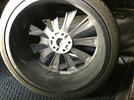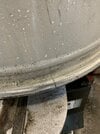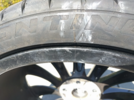Thought I'd share for anyone looking to upgrade to better looking and performing non-Tesla 19" wheels.
2020 Model S Performance. Here was my original setup: First photo below is a drive from Dallas to Austin yesterday with that wheel setup.
Here is my new setup I got yesterday in Austin. Same distance back from Austin to Dallas doing the same 72 on highway with cruise/auto-pilot.
Super happy with this setup! The 10+% efficiency gain is a bonus but just the upgrade in looks is worth it to me. If someone wants to do this and go a step further, I would recommend buying two sets of 437M front wheels and that way you will have a square 9 inch setup and you can run native Tesla spec 245x45x19 tires in front and rear. With the right EV-specific tires, this will be an incredibly efficient setup and nice upgrade over stock hubcap wheels.
I ordered custom center caps with Tesla logo though I think its funny to run BMW center caps ha. Enough talking, here are pics.





2020 Model S Performance. Here was my original setup: First photo below is a drive from Dallas to Austin yesterday with that wheel setup.
- 19" aero wheels.
- 8.5 inch wide, 245x45x19 square setup
- Goodyear RSA2 supposedly low rolling resistance tires. But these are pretty inexpensive tires so take Goodyear's claim for what its worth.
- 20MM wheel adapters in rear
- ~1 inch lowered on blox links
Here is my new setup I got yesterday in Austin. Same distance back from Austin to Dallas doing the same 72 on highway with cruise/auto-pilot.
- 19" BMW 437M wheels. These M3/M4 forged wheels are stupid light - 23 lbs front and 24 lbs rear. Including tires, I am now 8 lbs ligher per wheel&tire in front and 2.5 lbs lighter per wheel&tire in rear for a total of 21 lbs unsprung weight reduction.
- 9 inch front, 10 inch rear staggered setup
- Goodyear RSA2 245x45x19 tires in front (same as previous, I had them move front tires over) and 275x40x19 Continental DWS06 Sport+ all season tires in back. Total diameter of 275x40 same as 245x45.
- ITM TPMS sensors
- Turner motorsports 72 to 66 hub rings in aluminum - to adapt the BMW hub to Tesla
- No wheel adapters in front or rear as the BMW wheels have a more aggressive offset than stock aero wheels.
- ~1 inch lowered on blox links (no change from before)
Super happy with this setup! The 10+% efficiency gain is a bonus but just the upgrade in looks is worth it to me. If someone wants to do this and go a step further, I would recommend buying two sets of 437M front wheels and that way you will have a square 9 inch setup and you can run native Tesla spec 245x45x19 tires in front and rear. With the right EV-specific tires, this will be an incredibly efficient setup and nice upgrade over stock hubcap wheels.
I ordered custom center caps with Tesla logo though I think its funny to run BMW center caps ha. Enough talking, here are pics.
Last edited:





